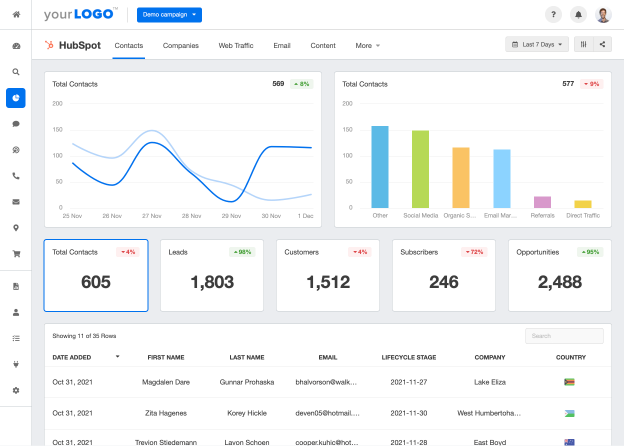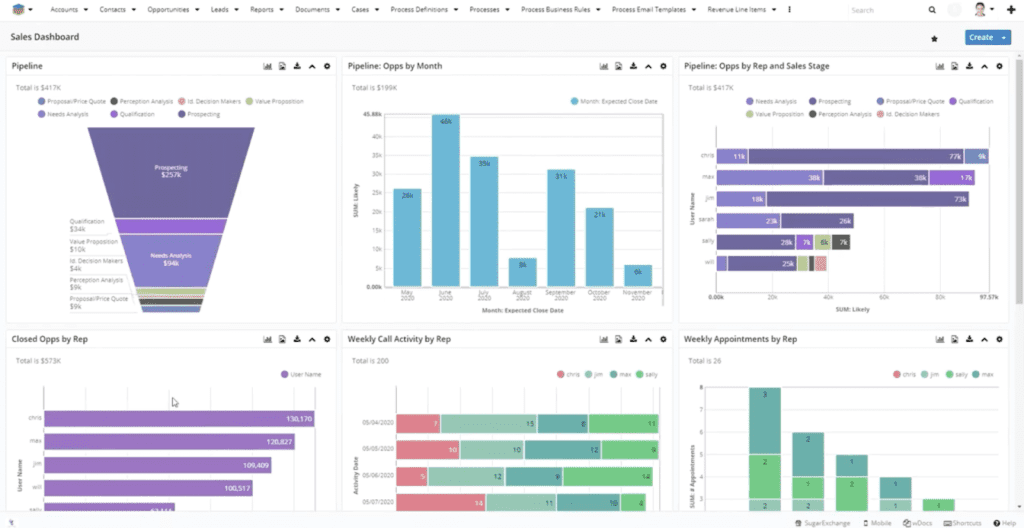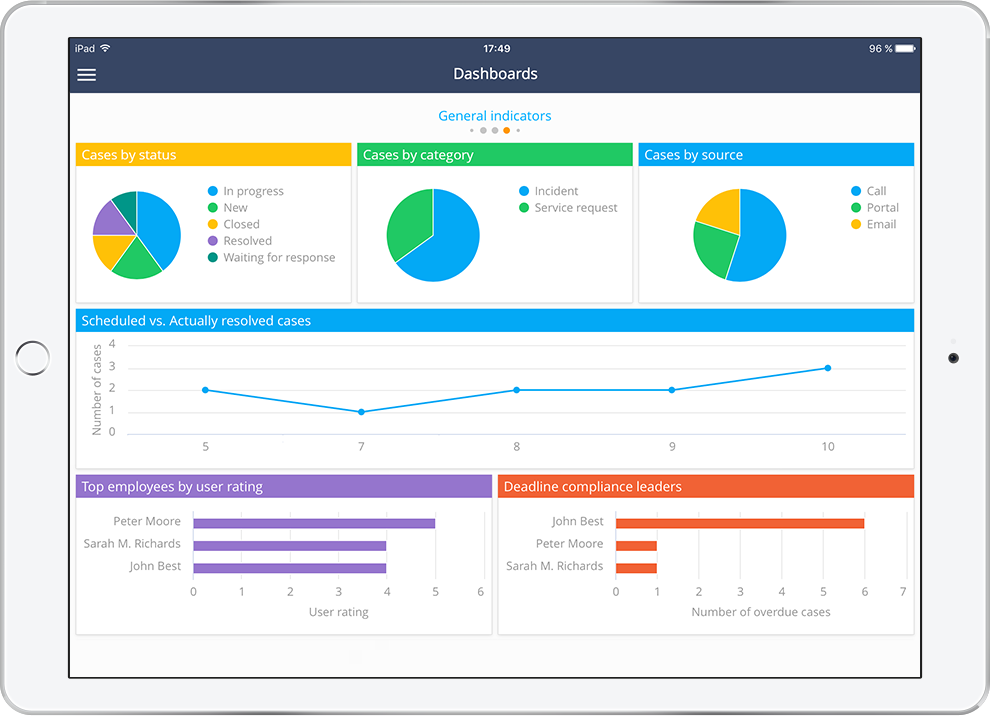It is becoming increasingly difficult to function in the modern digital economy without some form of automated customer management. Not only has ecommerce turned even the smallest business into a global entity, but the sheer speed at which goods and services are bought and sold these days has made it all but impossible to conduct business as a manual process.
Forrester Vice President and Principal Analyst Kate Leggett writes that CRM now offers enterprises and smaller companies the opportunity to pursue a deep “customer-first” perspective alongside operational efficiency. And as the enterprise wants to provide more personalized, differentiated experiences to customers, the CRM industry is responding with “componentized” and vertical offerings.
CRM vendors have added artificial intelligence (AI) components, says Leggett, including virtual assistants, robotic process automation (RPA) and other sophisticated automation capabilities to benefit sales teams and customer support staff.
With that in mind, we have compiled a list of the leading customer relationship management (CRM) platforms, with additional guidance for key verticals like government and small businesses.
Unlike other forms of business software, CRM represents a new way of working — one that should result in higher performance with less overhead. But this change will be managed gradually, requiring organizations to commit to a platform over a substantial period of time.
Table of Contents
What Are the Benefits of a CRM System?
- Better customer relationships: Everything the CRM solution does leads to improved customer relationships. Each contact and communication with a customer or potential customer that demonstrates knowledge of and care for that customer’s needs and desires cements a stronger, more beneficial relationship for both parties.
- Better communications with customers and coworkers: Highly organized and informed communications with customers and coworkers through a CRM solution create excellent customer satisfaction levels and smoother, more productive interactions within the marketing, sales and service team members.
- Improved customer service: A CRM solution can create one of the most highly prized goals for your company and for the customers: Great customer service. The more that every interaction is based on accurate, up-to-date information about the customer’s history with the company, the more satisfactory the service level and the higher the trust among the customer base.
- Increased automation of tasks: Automation of tasks in a CRM solution for managers and operational staff is beneficial in more than one way. Time savings and reduction in repetitive, frustrating tasks frees staff up for more productive activities. Efficient execution of a myriad of tasks in marketing, sales and service scales, which leads to growth in sales and revenue.
- Increased customer retention, upselling and engagement: Knowing as much as possible about your customers’ interests, requirements and history with your company and products, with the use of the CRM, is the basis for understanding them and giving them what they want, when they want it. Coordinated marketing efforts, informed service levels and timely offers are direct results of the CRM’s tools, with results that can be quantified.
- Higher sales results: A CRM solution’s features allowing for more accurate customer data, real-time tracking of all communications, personalization, lead management, cross- and up-selling and other efficiencies are designed for one of CRM’s most important benefits: improved results for the sales team.
- Higher employee satisfaction: Having access to accurate, actionable data for team members increases empowerment, autonomy, productivity, collaboration and efficiency. Being able to provide great service and achieve career goals with fewer obstructions or frustrations leads to an engaged, satisfied staff.
Also read: Advantages & Benefits of CRM
What are Features to Consider when Choosing CRM Software?
- Lead management: The lead management feature in a CRM solution spans marketing and sales, identifying potential customers who may show interest or interact with your company. These leads will be captured, tracked, organized, scored, nurtured and delivered to sales for engagement.
- Contact management: The contact management feature in a CRM solution tracks and organizes all information about customers, partners and other entities for an organization, and adds sales and marketing capabilities, such as personalized communication tools and relationship mapping.
- Reporting and analytics: Reporting and analytics in a CRM solution are at the heart of improving results. Access to real-time data by managers and operational staff leads to better business decisions on a daily basis and better strategic planning.
- Team management for sales, service, marketing: Team management tools in a CRM solution increase timely communication, access to fuller data and productivity. They can also reduce the need for excessive meetings and other time-consuming communications.
- Sales force automation: CRM solutions can automate sales force tasks, including data entry, contact management, appointment setting, inventory monitoring and some customer contacts.
- Sales forecasting: CRM solution sales forecasting tools use historical and real-time data to assist in forecasting short-term and longer-term sales results. AI-assisted forecasting is becoming more common in CRM.
- Mobile CRM: Mobile versions of CRM solutions can vary from basic functionality to fully featured versions, for use both outside and inside the office.
- AI: CRM solutions are quickly adopting AI for everything from faster and more accurate customer service to advanced analytics insights for internal use.
Top CRM Software
HubSpot CRM
Best CRM for Small Business and Best CRM for Startups
HubSpot CRM stands out as a free solution, “100 percent, forever,” so it’s a great place for small businesses to start when looking to streamline their email marketing capabilities. Using the product alongside the company’s sales, marketing and customer service platforms can increase efficiency in generating leads and revenue and providing seamless, customized customer service.
Key Features:
- Lead Management: Custom filters.
- Contact Management: Log every customer interaction automatically, sync with Gmail and Outlook.
- Reporting and Analytics: Essential sales reports are free. Advanced and custom reports available as add-ons. Add-ons available in the Starter level, which is $45 per month for 2 users, with additional users priced at $23 each.
- Team management for sales, service and marketing: Communication through live chat, team email, bots, centralized collection of all conversations.
- Sales force automation: Task automation is very easy to learn. Clean interfaces, plus free training documents and videos. HubSpot Academy, also free, offers a long list of courses that go from beginner to more strategic content.
- Sales forecasting: Sales Pipeline Tracker shows monthly forecasts, annual goals
- Mobile CRM: Fully featured HubSpot Mobile app
- AI: Artificial intelligence bots for customer service.
- Cost: HubSpot’s free version is truly free. The company’s CRM Suite bundle starts at $45/month, Professional at $1,600/month, and Enterprise at $5,000/month.
- Integration: HubSpot Connect tool discovers and integrates over 200 software packages, including MailChimp, WordPress, Slack, Salesforce, ZenDesk.
Salesforce CRM
Best CRM for Government and Best CRM Cloud Solution
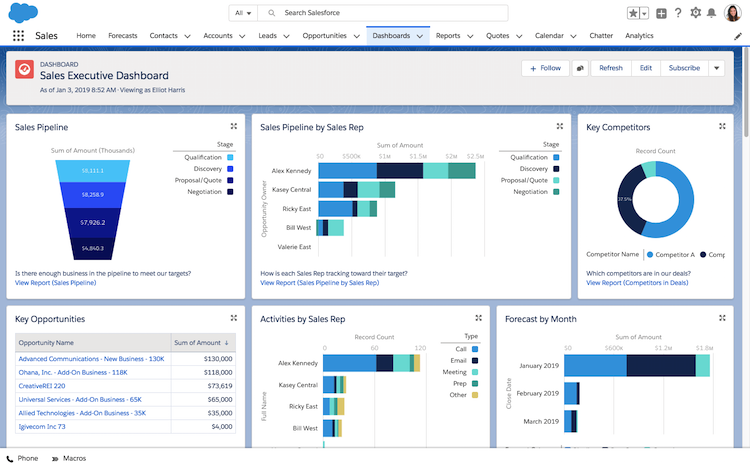
Salesforce has been the leader in CRM in the cloud for decades, with a highly integrated sales support platform. The company offers a large number of vertical solutions, for banking, government, health care, retail, consumer goods and more.
Salesforce CRM consists of a number of cloud modules that users can mix-and-match for specific use cases. The portfolio consists of a sales cloud that handles leads and scoring, while the service cloud provides call-center and self-service support. There is also a commerce cloud that unifies mobile, social, web and stored data under a predictive intelligence analytics engine.
Key Features:
- Lead management: Lead management enhanced with predictive scoring, intelligent automation and accurate forecasting.
- Contact management: Marketing Cloud focuses on creating “customer journeys” with intelligence marketing in email, mobile, social, digital advertising.
- Reporting and analytics: Industry leader with Einstein AI-augmented analytics, giving insights from Salesforce and non-Salesforce data.
- Team management for sales, service and marketing: Quip system centralizes actions and projects, cutting down on email and meetings.
- Sales force automation: cloud modules for Sales, Service, Marketing, targeting each user group’s needs and fully integrating all data.
- Sales forecasting: AI-augmented forecasting with Einstein provides insights, predictions inside enterprise apps.
- Mobile CRM: The Salesforce AppExchange app store has a portfolio of role-specific apps for its CRM product and partner apps to take every task mobile, going far beyond a mobile version of a CRM product.
- AI: Sales Cloud Einstein AI advanced analytics adds predictive analysis and explains intuitive factors behind the scores for the sales team.
- Cost: Integrations and pricing are provided on request.
- Integration: Leading app integration through AppExchange store. Developers and users can create apps with Lightning App Building and Heroku Enterprise, or integrate third-party apps. Salesforce’s MuleSoft AnyPoint Platform lets developers design and use APIs and software integrations across the enterprise.
Insightly
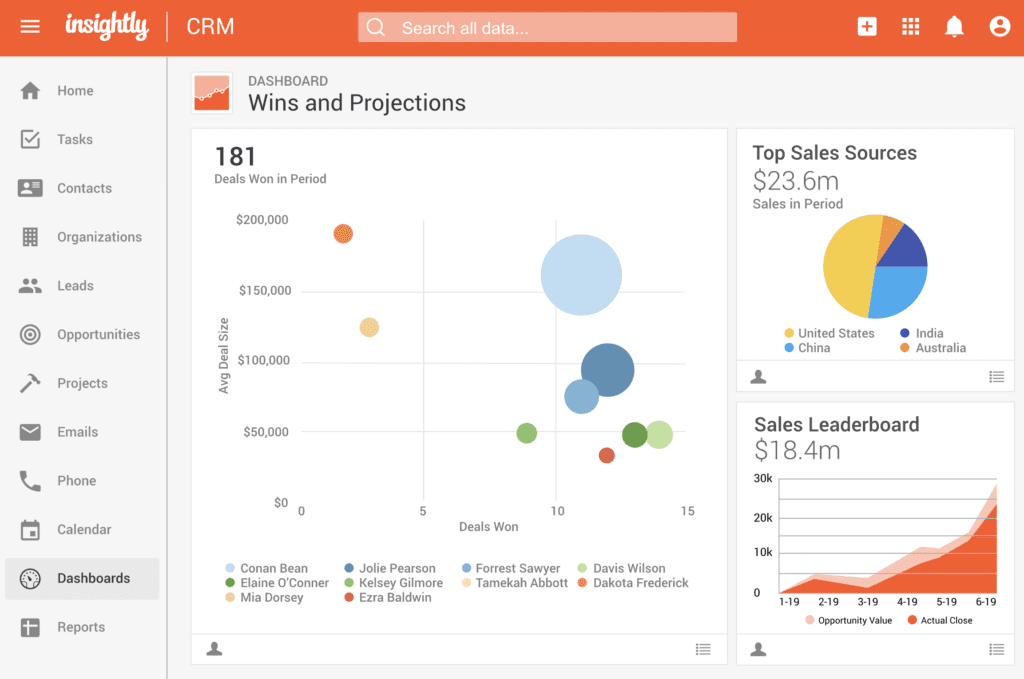
Insightly’s CRM system features a connections discovery tool that tracks organizational hierarchies, partnerships and contacts of key customers, as well as sales pipeline management and workflow automation capabilities to help close deals quicker. It also employs open APIs to connect to legacy apps and mobile services. The platform also features enterprise-grade data visualization, including territory visualization.
Key Features:
- Lead management: Automatic lead routing keeps sales up-to-date so opportunities are not missed.
- Contact management: Relationship linking and mapping shows who has the strongest relationship to a customer, uncovers hidden connections.
- Reporting and analytics: Data visualization displays clearly present opportunities as well as team successes in reports, dashboards and Insight Cards.
- Team management for sales, service and marketing: Projects feature set lets won opportunities be converted to projects seamlessly.
- Sales force automation: Advanced lead distribution and workflow automation let sales managers streamline and monitor processes in-depth.
- Sales forecasting: Focus is more on tracking and visualizations than forecasting.
- Mobile CRM: Mobile app for Android and iOS provides basic tasks, including project updating and calendar management.
- AI: AI bots for meeting scheduling.
- Cost: Insightly Plus is $29/user/month (billed annually), Professional is $49/user/month, and Enterprise $99/user/month.
- Integration: Application integration with Microsoft Outlook and Office365, Gmail, Google Apps, Xero, Quickbooks, Mailchimp and Slack.
Dynamics 365
Dynamics 365 from Microsoft bundles a number of stand-alone applications into a cohesive platform overseeing sales, service, financing, operations and other processes, in a business applications suite encompassing CRM and ERP. It features an AI engine that supports predictive analytics and mixed reality applications, as well as a development workshop for customizable apps that support personalized customer experiences.
Key Features:
- Lead management: Shows next best step to take, based on embedded insights. Also embeds custom insights from the organization in “action cards.”
- Contact management: Highly integrated enterprise-level tools create deep contact information, personalized communications, and identification of the most valuable connections.
- Reporting and analytics: Enterprise-level reporting and analytics lets sales managers design and direct processes and engagements at a very granular level.
- Team management for sales, service and marketing: Talent management gives HR and managers tools to hire, onboard and develop talent.
- Sales force automation: Sales force automation tailored to meet the needs of sales leader and sales operations roles
- Sales forecasting: Project service automation optimizes resources, forecasts project profitability and increases productivity
- Mobile CRM: Admin-managed Dynamics 365 for Customer Engagement for phones and tablets, specialized mobile apps for Field Service and Operations.
- AI: Dynamics 365 AI for Sales, Customer Service, Market Insights and Customer Insights gives immediate insights out of the box, and can be customized via Microsoft Azure.
- Cost: Dynamic 365 Sales Professional is $65 per user/per month; Dynamic 365 Sales Enterprise is $95 per user/per month; and Dynamics 365 Sales Premium is $135 per user / per month.
- Integration: Key integration opportunities include the Microsoft Relationship Sales solution, which combines Dynamics 365 for Sales Enterprise with LinkedIn Sales Navigator, at $162 per user/month, with a 10 user minimum.
Pipedrive
Best Overall CRM Software
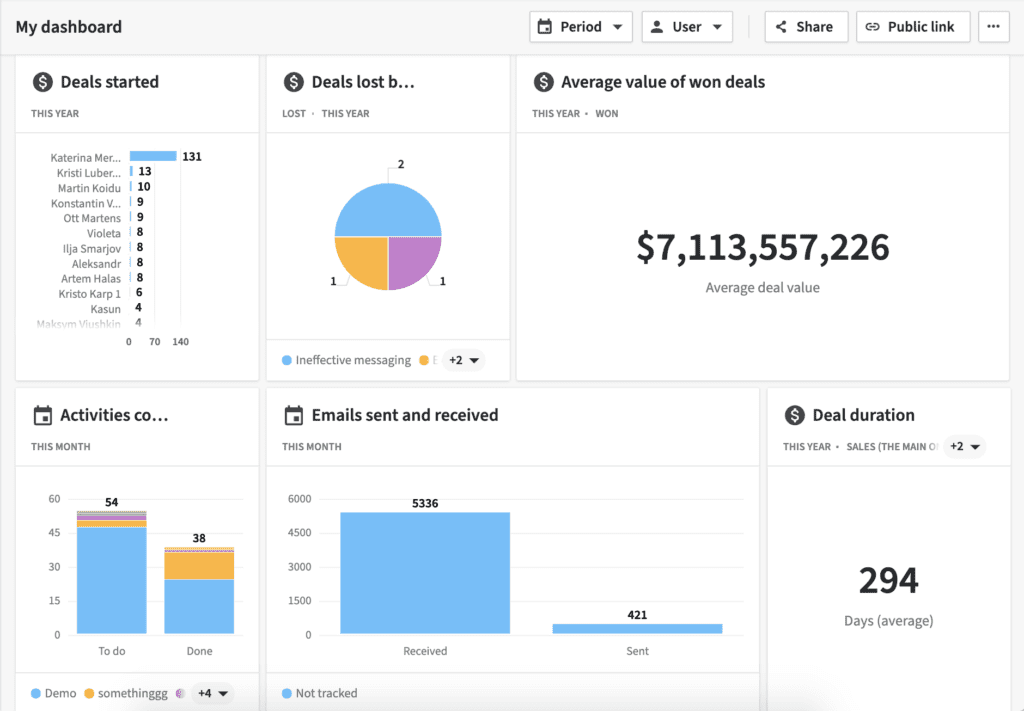
Pipedrive is visually intuitive and action-driven. The software uses a visually oriented display to highlight the actions that reps need to complete while analyzing performance to see what needs to be improved. Activity reminders, notifications and alerts are heavily used to keep activity moving forward. Users can try Pipedrive free to see if it is a good fit.
Key Features:
- Lead management: The lead management pipeline is the heart of the Pipeline product, keeping the focus on action items for both sales managers and sales operations.
- Contact management: Smart contact data: Instantly retrieve web data about contacts, such as from LinkedInReporting and analytics: Drag-and-drop to create customized reporting, analytics, statistics views, in a clean presentation.
- Team management for sales, service and marketing: Managers can customize as deeply as desired, but the focus in Pipeline is on the next actions to be taken, putting self-direction more center stage than in other packages.
- Sales force automation: Activity reminders and prompts throughout the entire sales process keep users focused on what step comes next.Sales forecasting: Forecasting tool shines in comparing progress and previous results in a quickly digested visual presentation.
- Mobile CRM: Mobile CRM app, synced with Outlook, Gmail, WhatsApp and more, is key to acting on Pipedrive’s reminders and alerts.
- AI: Pipedrive uses AI in its Smart Contact Data feature to retrieve contact info.
- Cost: Pipedrive Essential is $12.50 per user/per month; Advanced is $24.90 per user/per month; Professional is $49.90 per user/per month; Enterprise is $99 per user/per month.
- Integration: Email integration in two forms: Sales Inbox syncs with any major email provider. Smart Email BCC is for organizations where email is not as large a presence in the sales pipeline. Developer APIs for software integration, custom features.
Oracle NetSuite CRM
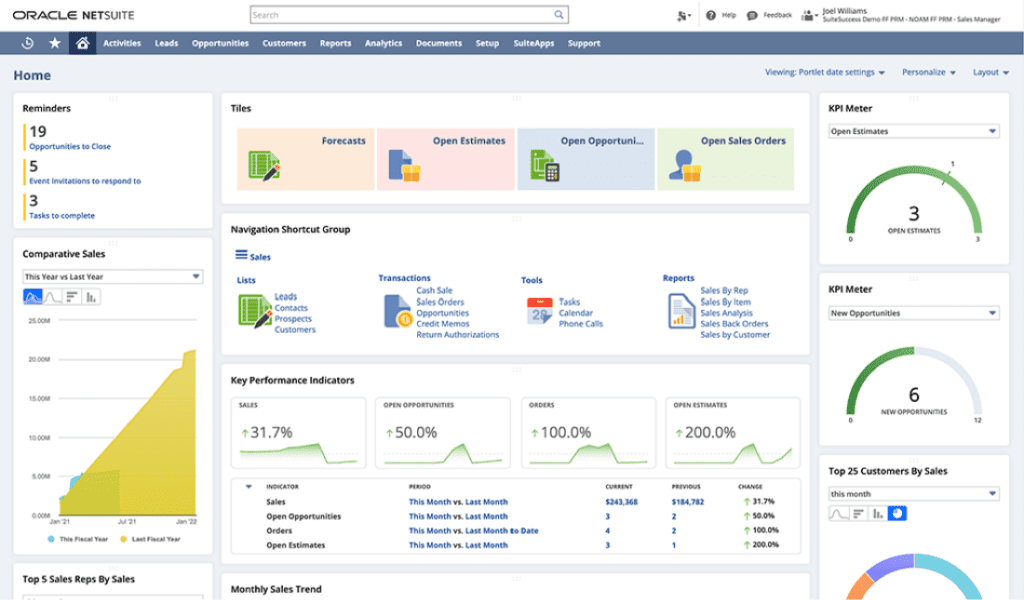
Oracle NetSuite CRM claims it is the only cloud solution in market that offers a true, real-time, 360-degree customer view. Underlying the claim is a deep feature set and offerings tailored for 20 separate industry categories and eight business types, from startups and small businesses to midsized businesses and the enterprise. Global sales and services organizations will be particularly interested in this CRM solution. One stand-out feature is website search engine optimization, which creates more search-engine-friendly pages and higher rankings, to connect with customers and prospects more quickly.
Key Features:
- Lead management: Sophisticated marketing automation solution aligns marketing and sales goals, guides multi-channel campaigns.
- Contact management: Customer service management portal gives sales, support, service and fulfillment access to all customer data.Reporting and analytics: Deep reporting capabilities integrating marketing, sales, service, finance, back-office, all in real-time, role-based dashboards.
- Reporting and analytics: Enterprises familiar with Oracle business solutions will quickly become comfortable with its CRM real-time business intelligence insights, dashboards, custom reports and historical trending information.Team management for sales, service and marketing: The Sales performance management feature offers sales directors tools for guided sales coaching and incentive programs, and gives sales staff mobile access to compensation tracking.
- Sales force automation: Sales force automation tools include CX Mobile, with voice-activated insights, and lead management with marketing and CPQ integration.Sales forecasting: Sales forecasting tools fully integrated with sales performance management tool for managers, 13-month trend information available.
- Mobile CRM: Oracle CRM On-Demand Mobile, Oracle Sales Cloud Mobile available for use with license.
- AI: NetSuite leads in AI, with embedded AI across all its enterprise software, including CRM, providing intelligent insights throughout business workflows.
- Cost: Users subscribe to NetSuite for an annual license fee, which is made up of three components: core platform, optional modules, and the number of users. There is also a one-time implementation fee for initial setup. Contact NetSuite for more pricing details.
- Integration: Pre-built or web services integration to Oracle solutions, single-sign-on, support for JDeveloper, IBM WebSphere, Microsoft .NET, BEA WebLogic and XML/SOAP APIs for data integration projects.
SAP CRM
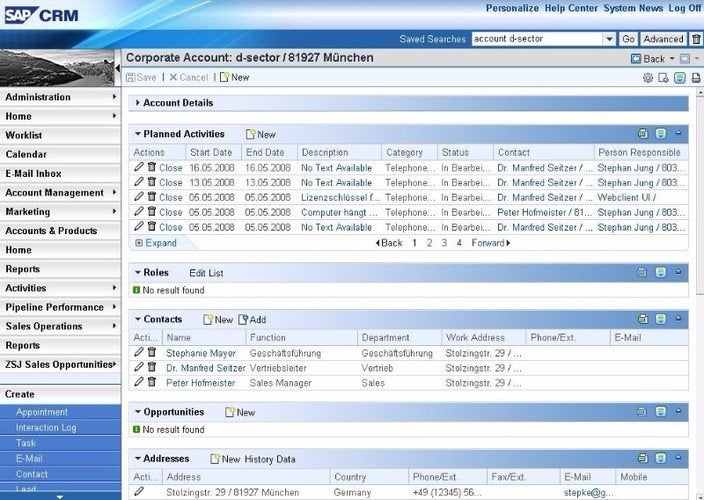
SAP CRM is a cloud-based solution of particular interest to enterprises that want to build and maintain a trust relationship with customers. Without sacrificing personalization or integrated data behind the customer experience, SAP CRM gives customers the data privacy that they require. Transparency and compliance are priorities.
Key Features:
- Lead management: Highly structured lead and sales management system will be of interest to large organizations with large sales groups that need fast configuring of complex product configurations, offers and contracts.
- Contact management: The SAP Customer Data Cloud feature gives customers a single-sign on, user-friendly environment where their privacy is prioritized and fraud protections are in place. The SAP Marketing cloud feature is another component of building a trust relationship, gaining consent for marketing engagements and demonstrating good data stewardship while optimizing revenue-building marketing actions.
- Reporting and analytics: Reporting and analytics capabilities that combine CRM with ERP and extended business processes.Team management for sales, service and marketing: The SAP Sales Cloud feature lets sales reps manage their sales with real-time analytics, and lets sales managers guide reps from quote to contract, if desired. Managers have access to gamification and incentives in the Service Cloud.
- Sales force automation: The SAP Service Cloud bridges the CRM and ERP worlds to give all service teams unified data for a unified service experience.
- Sales forecasting: System prioritizes accurate quarterly forecasting of sales and revenues, with granular sales performance management tools, including commission management and sales territory management.
- Mobile CRM: SAP CRM mobile app available with license.
- AI: Dynamic customer profiling uses machine learning and AI to create insights on customer behaviors and desires.
- Cost: SAP CRM pricing available upon request from the firm.
- Integration: SAPCRM is comprised of five cloud solution portfolios—eCommerce, Customer Data, Sales, Service, and Marketing—which can be integrated as desired. SAP’s developer tools provide APIs and other tools for integration of third-party systems.
Zendesk Sell

Zendesk’s Sell features an automated lead scoring system that pushes the most likely prospects to the forefront, while at the same time encouraging customer satisfaction and word-of-mouth marketing. It also includes features to help turn customers into advocates. Sell has a series of packages appropriate for small businesses through enterprise.
Key Features:
- Lead management: Lead prioritization with automated scoring puts the highest value leads front and center for the team.
- Contact management: Customer management starts with a 360-degree view of data, automated actions and territory smart lists, with a goal of not only closing a sale and satisfying the customer, but creating high customer satisfaction and advocacy.
- Reporting and analytics: Clean interface for reports and analytics, based on half a million data points for each customer. Team management for sales, service and marketing: Intuitive user interface makes the pipeline visibility frictionless, enhances collaboration between reps and managers.
- Sales force automation: Zendesk’s Sell emphasizes alleviation of administrative burdens with productivity features and a “consumer-grade user interface” that speeds users through tasks.
- Sales forecasting: Sell CRM caters to small businesses starting out in forecasting, and experienced enterprises. A Sales Forecast Template gets the former started, and forecasting model improvement guidance addresses the latter.
- Mobile CRM: Sell’s mobile CRM gives users all the functionality of the desktop solution, plus extra mobile features like geolocation and offline access.
- AI: Sell’s machine learning for sales forecasting focuses on close rate prediction and conversion estimation.
- Cost: A free trial is available, at any desired level. The Team level is $19 per user / per month for up to three users; the Professional level is $49 per user month; the Enterprise level is $99 per user / per month; the Elite level is $199 per user / per month and appropriate for the enterprise organization.
- Integration: Pre-built integrations with apps like DropBox, Google Drive, Hubspot, Kustomer and MailChimp are in the Sell Marketplace. Developers can use the Sell AP to meet integration needs.
SugarCRM
SugarCRM offers multichannel, end-to-end process automation, personalized dashboards and productivity tools, and deep-dive customer insight. The system can be deployed as a fully managed service or as a cloud or on-premises solution. SugarCRM for Enterprise focuses on organizations that want to create individualized experiences for customers. SugarCRM for Small Businesses focuses on flexibility with affordable, predictable pricing.
Key Features:
- Lead management: Lead management gives better routing processes between marketing and sales, and bases designation of hot leads on behavior scores for customers.
- Contact management: The Hint relationship intelligence service cuts down call preparation time, giving all needed contact and social information immediately. SugarCRM focuses on maximizing Net Promoter Scores (NPR) and customer satisfaction by creating customer loyalty and advocacy programs.
- Reporting and analytics: SugarCRM always focuses on a simple interface for data, keeping in mind that CRM easily becomes too complicated in presentation. Customize reports into Dashlets and customize user homepage to maintain focus on most relevant data.
- Team management for sales, service and marketing: SugarCRM is highly focused on solving the challenges facing management, particularly helping organizations with a history of poor adoption of CRM technology, with simplified tools and interfaces.
- Sales force automation: Automation is centered in the Sugar Productivity Suite, a visual step-by-step that keeps actions organized and on track.
- Sales forecasting: Small businesses can start with SugarCRM’s forecasting software modeling; with Enterprise, organizations can also drill down to line items in revenue data. Sugar Forecasts can be customized for enterprise-level complex sales processes.
- Mobile CRM: Small businesses can use the SugarCRM mobile app out of the box, or with a few user-selected customizations. Enterprises can distribute configured and role-personalized apps through app stores.
- AI: SugarCRM uses its Hint AI to eliminate data entry and a large amount of manual research, pulling the customer data that the team needs into the CRM instantly.
- Cost: SugarCRM offers five pricing tiers: Sugar Market starts at $1,000 per month for 10K contacts; Sugar Sell starts at $80 per user / per month for a minimum of of three users; Sugar Serve starts at $80 per user / per month for a minimum of of three users; Sugar Enterprise starts at $85 per user / per month for a minimum of of three users; Sugar Professional starts at $82 per user / per month for a minimum of of three users.
- Integration: The vertical-specific solutions for manufacturing, business services, financial services, commercial banking, capital markets, wealth management, credit unions and insurance are built to integrate with legacy systems and support specialized user groups.
Zoho CRM
Best CRM for Real Estate

Zoho CRM provides real-time customer connectivity across multiple channels, as well as sales pipeline blueprints to automate repetitive processes. It also offers a wealth of collaborative tools including an interactive calendar, a document library, and a centralized discussion portal. It features integration with third-party platforms like Google, DocuSign, and LinkedIn. With a free version, a free trial and attractive pricing, this is a good choice for smaller businesses and organizations new to CRM, as well as for larger businesses and enterprises.
Key Features:
- Lead management: Web-based companies benefit from Zoho’s clean capture forms; pre-built lead distribution tools and engagement scoring make getting up to speed easier.
- Contact management: SalesSignals is Zoho’s alerting feature, giving real-time notifications when a customer interacts in any way with your company, so the response will be immediate. SalesSignals are customizable to desired channels.Reporting and analytics: 40 standard, pre-built reports get users started. Customize reports, create visuals and add to dashboard or view as pop-out windows as you work in the CRM tool.
- Team management for sales, service and marketing: Team collaboration in Zoho CRM can be prioritized with basic features like document libraries and synced calendars, and with additional tools including Gamescope for healthy competition, a Feed for all ongoing CRM discussions, and a chat feature.
- Sales force automation: Blueprint is Zoho’s action guide, prompting users to take actions and provide information at the correct time. Especially useful for new hires.Sales forecasting: Within sales management, the AI-powered anomaly detector compares sales performance with predicted trends, shows deviations from sales patterns.Mobile CRM: Take Zoho mobile with the app, and use geolocation to find nearby prospects.
- AI: Zia is Zoho’s AI assistant feature, offering everything from simple answers to conversational questions, to sales assistance for mobile reps, to complex calculations and analytics.
- Cost: In addition to a free trials at every price point, Zoho CRM is offered in four pricing tiers: Standard starts at $14 per user / per month; Professional is $23 per user / per month; Enterprise is 40 per user/ per month; Ultimate is $52 per user / per month.
- Integration: Zoho CRM Marketplace integrates curated apps including PieSync, Edison, Spotfone, PandaDoc, Aircall and hundreds more.
Read TechnologyAdvice’s: The Best Real Estate CRM Software
Creatio CRM
Creatio CRM offers a low-code, single platform to manage sales, marketing, and service with the goals of boosting lead generation, improving customer retention, managing complete sales cycles, automating sales processes, streamlining customer engagements, and accelerating service delivery.
Key Features
- Lead management: Utilizes customer data to develop a 360-customer view to build more targeted communications.
- Contact management: Creatio CRM feature is available in two versions: Customer Center is best for companies that want to manage omnichannel communications.
- Service Enterprise is best for medium-sized to large companies that want to deliver service across multiple communications channels and include some BPM features.
- Reporting and analytics: The platform takes a business process-oriented view of reporting, offering very detailed field force management, contract management, and product management reports.
- Team management for sales, service and marketing: The user interface mimics that of a familiar social network, making it intuitive and boosting adoption. The Communication Panel feature holds all notifications and communications, and allows collaboration in the Enterprise Social Network, which resembles well-known mainstream social network platforms
- Sales force automation: Best practices can automate any process, whether unstructured or structured.
- Sales forecasting: Forecasting tool applies probability of closing to opportunities in pipeline, helping managers more accurately predict plan vs. actual results.
- Mobile CRM: Mobile app offers basic features and access to streamlined data and features. For Android and iOS.
- AI: Intelligent data enrichment tool compiles customer data from open sources automatically, organizes it and presents it, saving valuable research time.
- Cost: Creatio CRM offers a free trial, but pricing varies by bundle. Contact their sales team for best pricing information.
- Integration: The platform connects curated applications, templates, and services for users, including GoToWebinar, Smooch, MailChimp, Dotmailer and hundreds more.
This article was updated by IT Business Edge’s Editor Llanor Alleyne in January 2022.
Read next: Top 6 Trends Shaping Digital Transformation in 2022


